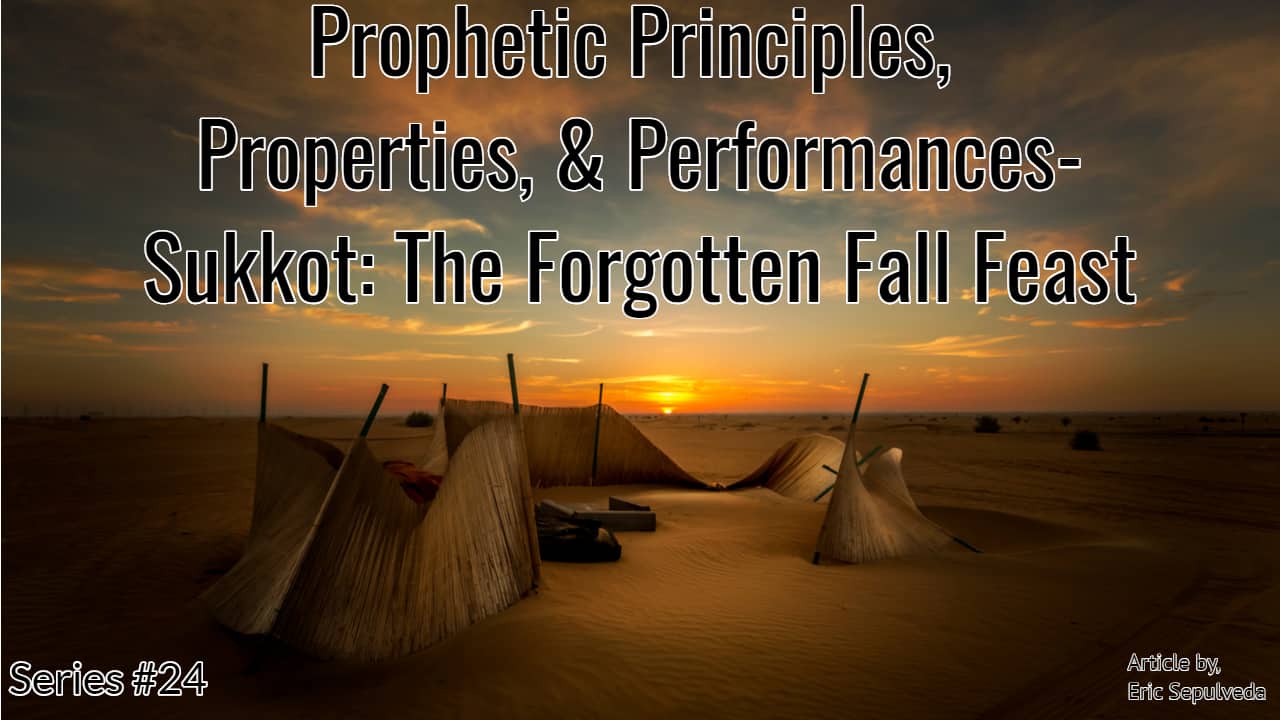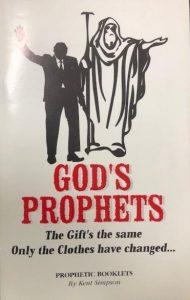
Prophetic Principles, Properties, & Performances-
Sukkot: The Forgotten Fall Feast
Often referenced to as simply “The Festival”, Sukkot: The Festival of Tabernacles or Ingathering, was one of the most important and eagerly looked forward to celebrations in the Jewish religious calendar. It was once one of the most important Jewish celebrations, and one of the most important moments in Christianity, but most modern Believers have never heard its name.
Sukkot, the festival of booths, would start on the fifteenth day of the seventh month and last seven days. The first day would be holy and people would not be allowed to work, and on the eighth day they would observe a holy convocation and hold a solemn assembly. The people of Israel would be required to travel to the location of the Tabernacle to observe this feast every year, and celebrate by taking natural plant materials and making temporary shelters, which they would live in for seven days. This would stand as a reminder to the generations of future Israelites that G3D made the people of Israel live in booths when He brought them out of the land of Egypt and they relied on Him for everything and He faithfully provided (ref. Leviticus 23:33-43).
Sukkot is not mentioned again until the construction of the Temple, when a permanent location for the festival was established. After the week-long festival in Jerusalem, when King Solomon consecrated the Temple and Altar starting on Rosh Hashanah, the citizens went back to their homes, but the faithful citizens returned on the fifteenth day of the seventh month to celebrate Sukkot (1 Kings 8:64-66; 2 Chronicles 7:8-10). They celebrated for seven days and had a holy convocation on the eighth day, as Scripture laid out, and King Solomon dismissed them on the twenty-third day.
After the Exile of the Northern Kingdom and the Destruction of the Temple, there was a push for religious revival in Israel and it began with the rebuilding of the walls of Jerusalem and the dedicated teaching of the Law. Starting on Rosh Hashanah, Ezra the Scribe read the Book of the Law of Moses to the assembly in Jerusalem on the first day of the seventh month. On the second day, they realized that they had not been celebrating Sukkot, one of the most important holidays mandated by G3D. They discovered that they were to live in temporary shelters during this celebration, and that they should proclaim this word and spread it throughout their towns in in Jerusalem. Messengers proclaimed “Go out into the hill country and bring back branches from olive and wild olive trees, and from myrtles, palms and shade trees, to make temporary shelters”.
Excited about trying to keep the instructions they had just been given, “the people went out and brought back branches and built themselves temporary shelters on their own roofs, in their courtyards, in the courts of the House of G3D and in the Square by the Water Gate, where Ezra the Scribe was preaching, and the one by the Gate of Ephraim.” Many people had been forced into exile after the initial destruction of the Temple, but “the whole company that had returned from exile built temporary shelters and lived in them.” It had been hundreds of years, but “from the days of Joshua, son of Nun, until that day, the Israelites had not celebrated it like this. And their Joy was very great”. Ezra continued to read from the Book of the Law of G3D, and “they celebrated the festival for seven days, and on the eighth day, in accordance with the regulation, there was an assembly (ref. Nehemiah 8).
This Sukkot celebrated by Ezra the Scribe may have rejuvenated the country’s passion for the Lord’s Feasts as we see that it has become regularly celebrated by the time of Christ’s Ministry.
After the feeding of the five thousand and four thousand and the explanation that followers would need to eat Christ’s Flesh and drink His Blood, many of the crowds abandoned Him and He essentially stayed in the Galilee region to avoid being captured by the religious elites who sought to kill him (ref. John 6:21-66).
As the Festival of Tabernacles was drawing near, Jesus’ brothers encouraged Him to leave Galilee and head to Judea so that His Disciples could see the miracles He was known for. In reality, His brothers did not believe in Him, and even suspected that He was out of His Mind (ref. Mark 3:21), but they still recognized that it was necessary that every devout Jew go to Jerusalem to observe the Fall Feast.
Christ insisted they go without Him, but after they had left for the festival, Jesus went to Jerusalem in secret and remained hidden. It wasn’t until halfway through the celebration that Jesus went up to the Temple Courts and began to teach (ref. John 7:1-14).
On the eighth and last day of the festival and during the water libation ceremony, Jesus stood and said in a loud voice, “Let anyone who is thirsty come to me and drink. Whoever believes in me, as Scripture has said, rivers of Living Water will flow from within them”, essentially declaring Himself the true source of Living Water (ref. 7:37-38). It was also on the eighth day, in front of the giant candles that lit up the Temple, that Jesus declared that He was the Light of the World and that whoever followed Him would never walk in Darkness, but would have the Light of Life (ref. John 8: 12). It would also be on this day that Christ would be transfigured on the Mount of Olives (ref. Matthew 17:1-11; Mark 9:2-13; Luke 9: 28-36; John 8:1)
Multiple times, Sukkot, one of the most significant of G3D’s Feasts, was forgotten and not celebrated as faithfully and joyfully as G3D expected. This failure to observe the eight day festival may have been a key reason why Israel constantly turned from Him, since they trusted in their own strength and works rather than G3D’s Providence. After the Temple dedication was completed, Solomon ensured that his countrymen return to celebrate Sukkot as well. When Ezra the Scribe was leading the religious revival during the reconstruction of Jerusalem’s Walls, the people felt the need to ensure that the whole country make an effort to observe the holiday. Even during Christ’s time on Earth, He felt is was important that He participate and it was the timing of some of His most important public declarations about Himself and the date of His Transfiguration.
The recognition and celebration of Sukkot by modern Believers should be encouraged since, along with Passover and Pentecost, it was the timing of one of Christianity’s most important events. During this current moment of crisis and fear, we need to recognize that this life is temporary and that G3D will faithfully provide for His People. That was the core message G3D wanted the Israelites to learn from the holiday, and it’s a lesson we need to remember especially now.
Prepared by, Kent Simpson, Apostolic Prophet & Eric Sepulveda, PMT Administrator
For more prophetic media groups click here


